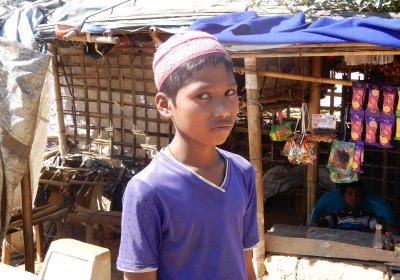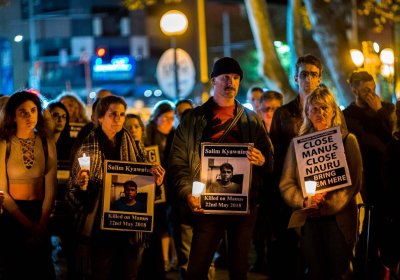More than 2000 refugees and migrant workers have been rounded up by Malaysian authorities since May 1, in a series of sweeps through communities under the pretext of combatting COVID-19, writes Peter Boyle.
Rohingya refugees
To date, there have been no cases of COVID-19 among the close to a million Rohingya refugees currently sheltering at camps in southern Bangladesh, writes Paul Gregoire. However, the danger of a mass outbreak is very real.
A boat carrying 200 Rohingya men, women and children was turned away from Malaysian shores by the Royal Malaysian Navy on April 16, writes Alex Salmon. This move comes amid growing xenophobic sentiment against Rohingya refugees in Malaysia.
Rohingya refugees living in a refugee camp in Bangladesh are just surviving, as they look towards the day when they can return to their homeland, writes Paul Gregoire.
Refugee activists in Melbourne, Canberra and Sydney held protest vigils for Salim Kyawmin, an elderly Rohingya man who died on Manus Island on May 22. The largest action was in Melbourne where 200 people occupied the streets for a short, time stopping traffic. In Perth refugee activists occupied the department of Immigration, making flowers and in Brisbane a protest was held in front of Peter Duttons office.
Habiburahman, a Rohingyan refugee and founder of the Australian Burmese Rohingya Organisation, has called on the Australian government to suspend its military aid to Burma (Myanmar). Australia currently spends $450,000 a year on aid to the Burmese military.
Habiburahman was speaking at a public meeting on March 28, organised by the Refugee Action Collective.
He called for a halt to Australian investment in Burma, with human rights conditions being imposed on any resumption. Woodside Petroleum has invested $400 million in offshore gas and oil exploration.
During the early hours of August 25, some 20 to 30 police posts were attacked in Maungdaw, Buthidaung and Rathedaung townships in the north of Rakhine State in Myanmar (also known as Burma). Twelve police were killed along with 16 attackers.
Responsibility for these attacks was later claimed by the Arakan Rohingya Salvation Army (ARSA).
In the two weeks since, the Myanmar military’s response has been brutal, widespread and indiscriminate. While accurate figures are not available, between 400 (military’s estimate), and “around a thousand” (United Nations estimate) Rohingya have been killed by the army.
The victory of Nobel Peace Prize winner Aung San Suu Kyi’s National League for Democracy (NLD) in the November 2015 national elections in Burma (Myanmar) was hailed by Western leaders as heralding a new era of democracy and respect for human rights in the country.
Once isolated by sanctions imposed on the pretext of the widespread human rights abuses by previous military regimes, Burma is now a profitable destination for Western investment. By September, the US had lifted its last remaining sanctions.









